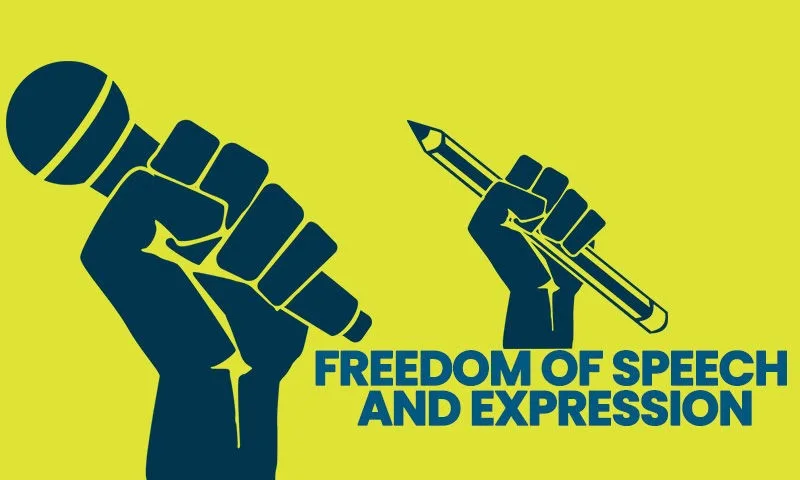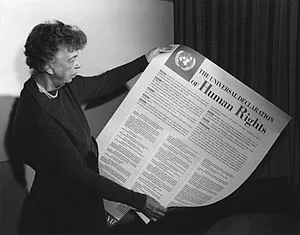
Freedom of speech and expression
Freedom of opinion and expression has been a yearning for humanity in the recent ancient and modern periods. These are basically the ability to speak our minds, seek any kind of information or answers to concerned queries, or give information on the decided topics of their wish independently without any fear of force, restrictions, coercion, penalty, or suppression by the government of the state concerned.
The preamble of the United Declaration of Human Rights recognizes the dignity and equal and inalienable rights of all human beings to lay the foundation of justice and maintain peace and harmony. Article 19 of the United Nations Declaration on Human Rights and Article 19(1)(a) of the Indian Constitution deals with the freedom of speech and expression of its citizens. Without the recognition of this right as freedom would merely lead a state towards dictatorship where the executive authority holds supremacy and the people are bound to gasp everything keeping shut.

All citizens have the right to express their thoughts, views, and opinions without any force and that is what is called freedom of opinion and expression. This is a basic right of a being that proves its existence as a civilized being and a responsible citizen. The Supreme Court recognized the freedom of speech and expression as crucial and of great importance for it allows the citizens to freely propagate, innovate and circulate their concepts, ideologies, and thoughts.
This also enhances the true meaning of a democratic country. The honorable Supreme Court in the case of Bennett Coleman and Co. vs. Union of India (1972) held that the right to free speech and expression is incorporated within the freedom of the press. In the landmark judgment of the case Maneka Gandhi vs. Union of India the Supreme Court held that freedom of speech and expression has no geographical limitations and it carries with it the right of a citizen to gather information and to exchange thoughts with others not only in India but abroad also.
This freedom comes with certain restrictions on the following heads- security of the state, friendly relation with foreign states, public order, decency and morality, contempt of court, defamation, incitement to an offense, sovereignty, and integrity of India. Nothing violating the above-mentioned shall be regardless right of a being.

The Indian Constitution does not mention the word ‘press’ in defining the freedom of speech and expression. Freedom of the press has been incorporated within this section with laws such as the Official Secrets Act and the Prevention of Terrorist Activities Act to maintain the limit of press freedom. The case of Romesh Thappar vs. the state of Madras was among the earliest cases decided by the honorable Supreme Court declaring the freedom of the press as a part of freedom of opinion and expression.
The vogue phrase ‘decency or morality’ that have been used in Article 19(2) of the constitution has enabled the state to engage in widespread moral policing of mass media, entertainment, and film industry since from time to time religious group have objected their ideas and values as indecent. In India, hate speech laws are quite often abused by political organizations and other major influential people and rare cases result in a conviction, this often leads to self-censorship by the common people.
In August 2022, over 100 notable writers including Marina Abramovic, Azar Nafisi, Orhan Pamuk, etc, and many renowned artists joined PEN International and PEN America in collaboratively signing the statement proposed expressing their concern over the current repressive state of freedom of speech and expression in India to President Draupadi Murmu to support the democratic ideologies and safeguard the public interest. In the present time, people are being charged under sedition and UAPA for expressing themselves or rather say criticizing the government but this is somewhere attack on the fundamental right of a citizen in a democratic country too.
“intolerance of dissent from the orthodoxy of the day has been the bone of Indian society for centuries. But it is precisely in the ready acceptance of the right to dissent, as distinct from its mere tolerance, that a free society distinguishes itself” – A G Noorani 1999. Though the freedom of expression and opinion is a fundamental right of all citizens as stated in the Indian Constitution, nevertheless it does not guarantee an absolute individual right to freedom of expression. Rather, it envisages reasonable restrictions imposed by law on such rights. For a democratic country like India, it is the essence of democracy else it would have been an authoritarian state.







